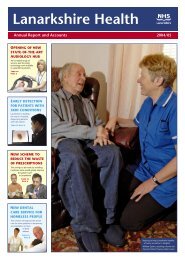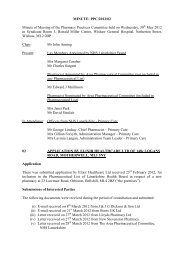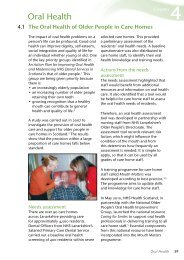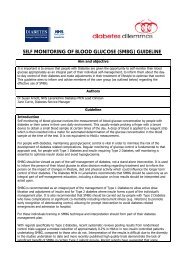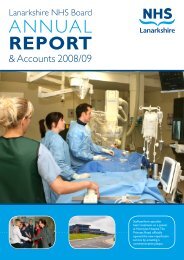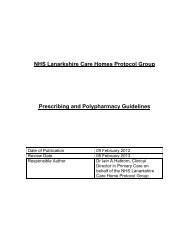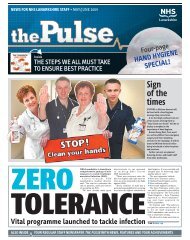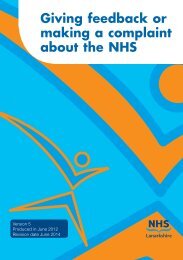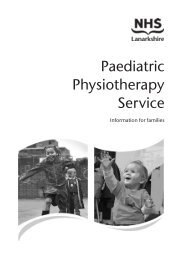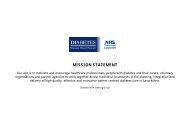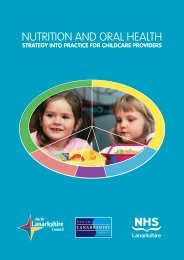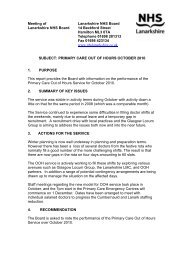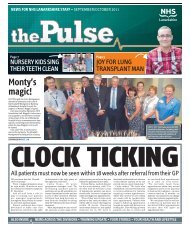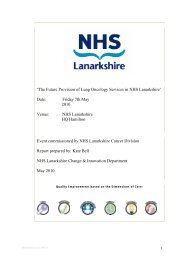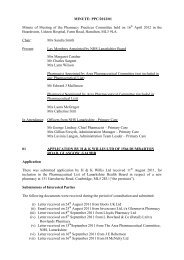The Pulse September / October 2009 - NHS Lanarkshire
The Pulse September / October 2009 - NHS Lanarkshire
The Pulse September / October 2009 - NHS Lanarkshire
You also want an ePaper? Increase the reach of your titles
YUMPU automatically turns print PDFs into web optimized ePapers that Google loves.
8<br />
the<strong>Pulse</strong> GENERAL NEWS SEPTEMBER/OCTOBER <strong>2009</strong><br />
KEN WELCOMES<br />
ANOTHER TERM<br />
KEN Corsar has been reappointed<br />
as <strong>NHS</strong> <strong>Lanarkshire</strong>’s chairman<br />
for a further four years.<br />
<strong>The</strong> announcement was made by<br />
Nicola Sturgeon in August, when she<br />
also announced the reappointment<br />
of the chairs for <strong>NHS</strong> Ayrshire and<br />
Arran, <strong>NHS</strong> Grampian and<br />
<strong>NHS</strong> Orkney.<br />
Ms Sturgeon, the Cabinet<br />
Secretary for Health and Wellbeing,<br />
said: “I am very pleased to announce<br />
these re-appointments.<br />
“All of the chairs concerned are<br />
extremely committed to public<br />
service and have demonstrated a<br />
clear understanding of the issues<br />
being faced within <strong>NHS</strong>Scotland.<br />
“<strong>The</strong>ir wealth of experience and<br />
knowledge have been invaluable to<br />
their boards and I look forward to<br />
continuing to work together with<br />
them in improving the health of the<br />
people of Scotland.”<br />
Ken is looking forward to<br />
continuing to help <strong>NHS</strong> <strong>Lanarkshire</strong><br />
provide first-class patient care.<br />
He said: “I am delighted to have<br />
been reappointed. Over the past<br />
four years, the health board has<br />
made remarkable progress in<br />
improving patient care, improving<br />
and increasing the services offered<br />
in the community, reducing the<br />
health inequality gap and cutting<br />
waiting times.<br />
“<strong>The</strong>re will be many more<br />
challenges to face in the next four<br />
years. However, I am confident that<br />
with <strong>NHS</strong> <strong>Lanarkshire</strong>’s dedicated<br />
and motivated staff, along with our<br />
local authority partners, we will<br />
continue to improve the health of the<br />
people in <strong>Lanarkshire</strong>.”<br />
Ken joined the <strong>Lanarkshire</strong><br />
<strong>NHS</strong> Board as a non-executive<br />
member in 2003 and became<br />
chairman in 2005.<br />
A graduate of St Andrews<br />
University and Glasgow University,<br />
he taught in several secondary<br />
schools. Ken joined the education<br />
directorate of Strathclyde Regional<br />
Council in 1975 and was apponted<br />
as director of education for Glasgow<br />
City Council in 1995 where he<br />
worked until 2002.<br />
Ken Corsar: “Delighted”<br />
In brief…<br />
Equality<br />
programme<br />
A NEW equality programme to<br />
improve the way <strong>NHS</strong> <strong>Lanarkshire</strong><br />
handles discrimination in<br />
healthcare is being developed.<br />
<strong>The</strong> new Single Equality<br />
Scheme (SES) will mean moving<br />
from the three existing equality<br />
schemes – Disability, Gender and<br />
Race – by December <strong>2009</strong>.<br />
While the SES will continue to<br />
cover disability, gender and race,<br />
it will also include age, gender<br />
reassignment, marriage or civil<br />
partnership, religion or belief,<br />
pregnancy and maternity, and<br />
sexual orientation.<br />
Hina Sheikh, equality and<br />
diversity officer, said: “To inform<br />
the SES, <strong>NHS</strong> <strong>Lanarkshire</strong> will be<br />
carrying out stakeholders’<br />
engagement exercises in<br />
<strong>September</strong> with staff and service<br />
users. We want to know what else<br />
should be included in a scheme to<br />
make sure we are treating<br />
everyone fairly, and we also want<br />
to know if people have suffered<br />
any discrimination, whether as a<br />
patient or as a member of staff.”<br />
Staff will receive a leaflet<br />
explaining the scheme with their<br />
August payslips and are asked to<br />
return the questionnaire by the<br />
end of <strong>September</strong>.<br />
Patients, visitors and carers are<br />
also being asked to complete a<br />
similar questionnaire. Staff will<br />
be provided with a supply of<br />
leaflets for public distribution.<br />
Completed forms need to be put<br />
in the self-addressed envelope<br />
and returned through internal<br />
post. Clear instruction and<br />
guidance for staff will be included<br />
in all packs sent out.<br />
MRSA screening<br />
HR team<br />
signs up<br />
for new<br />
deal to<br />
improve<br />
service<br />
<strong>NHS</strong> <strong>Lanarkshire</strong>’s Human<br />
Resource service has recently<br />
been involved in a number of<br />
new developments.<br />
<strong>The</strong> service, which is led by<br />
John White, head of resourcing,<br />
delivers employee services<br />
including recruitment, HR,<br />
administration, job evaluation,<br />
workforce planning and<br />
the management of the HR<br />
system Empower.<br />
<strong>The</strong> HR resourcing team has<br />
signed up to full participation in<br />
a Local Employment Partnership<br />
with JobCentre Plus.<br />
John said: “Local Employment<br />
Partnerships aim to tackle the<br />
increasing recruitment and skills<br />
challenges of the labour market<br />
and economy.<br />
“Thousands of employers across<br />
the country have signed up to<br />
these partnerships to open<br />
up employment and training<br />
opportunities to disadvantaged<br />
jobseekers and realise the<br />
untapped potential of those whose<br />
ability is often overlooked.”<br />
<strong>The</strong> primary objectives of this<br />
agreement are:<br />
q To offer work trials<br />
q To offer opportunities for New<br />
Deal participants<br />
q Develop pre-employment skills<br />
training programmes<br />
q Providing opportunities to<br />
existing employees to mentor<br />
people who wish to return to work<br />
q Participating in new ways to<br />
assist people back into work.<br />
<strong>The</strong> resourcing team have also<br />
introduced a 24-hour recruitment<br />
line. By calling 01698 377740 (the<br />
NEW DEVELOPMENTS:<br />
the HR team is all set to<br />
take up the challenge<br />
internal number is 733 7740),<br />
callers will be provided with<br />
four options:<br />
q Request an application pack for<br />
a specific vacancy<br />
q Request to join the staff bank<br />
q Request a call back for a<br />
general employment enquiry<br />
q Request to speak to a member<br />
of the recruitment team.<br />
John added: “<strong>The</strong> introduction of<br />
the hotline and email address<br />
offers a wider range of application<br />
routes, encourages online<br />
recruitment and enables enquiries<br />
to be handled more effectively.”<br />
A recruitment email account –<br />
recruitment@lanarkshire.<br />
scot.nhs.uk – is also available to request<br />
the same details electronically.<br />
NON-EMERGENCY admissions to<br />
<strong>Lanarkshire</strong>’s acute hospitals will<br />
be screened for MRSA from<br />
November.<br />
This will be followed by<br />
screening from January 2010 of<br />
the following emergency<br />
admissions: care of elderly, renal,<br />
vascular surgery and<br />
dermatology.<br />
It is part of a national<br />
screening programme, which all<br />
<strong>NHS</strong> boards will be participating<br />
in, to reduce the risk of patients<br />
contracting MRSA.<br />
A small percentage of patients<br />
who are admitted to hospital<br />
have the MRSA bacterium on<br />
their skin or in their nose already,<br />
even though they may feel well.<br />
<strong>The</strong> MRSA bacterium is more<br />
likely to cause an infection in<br />
people who are unwell, so it is<br />
important to identify patients in<br />
hospital who are carrying it<br />
before it can infect them or<br />
spread to other patients.<br />
<strong>The</strong> screening process involves<br />
a simple nasal swab as part of<br />
the pre-admission procedures.<br />
For patients carrying MRSA,<br />
decolonisation involves an<br />
antibiotic ointment in the nose<br />
and anti-bacterial body wash<br />
before they are admitted<br />
to hospital.



